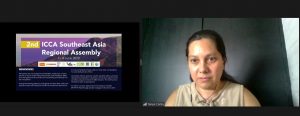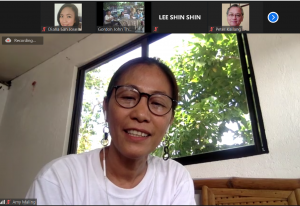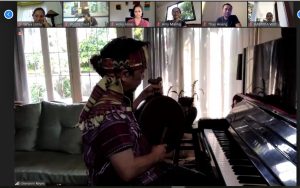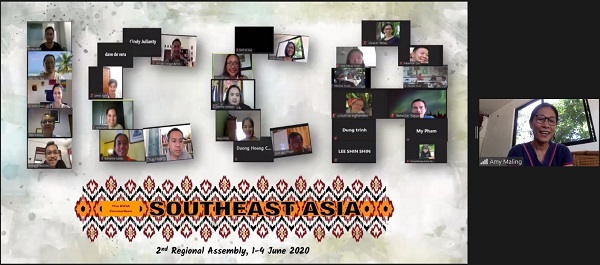First published on 06/05/2020, and last updated on 09/16/2020
By Jon Robin Bustamante (Non-Timber Forest Products – Exchange Programme – NTFP-EP Asia), with contributions from Diana San Jose (NTFP-EP Asia) and Gordon John Thomas (PACOS Trust). NTFP-EP and PACOS Trust are ICCA Consortium Members.
Members, Honorary members and partners from across Southeast Asia took to cyberspace as the ICCA Consortium held its 2nd Southeast Asia Regional Assembly from 1-4 June 2020 via Zoom, the first regional assembly to be held entirely online. The regional assembly welcomed guests and participants from Indonesia, Malaysia, Myanmar, Lao PDR, the Philippines, Taiwan and Vietnam (and Nepal for one session!) for four days of online meetings and webinars, with NTFP-EP Asia serving as facilitator and technical host.
ICCA Consortium President Teddy Baguilat opened the regional assembly with welcoming remarks and general updates on the work of the Consortium while Holly Jonas, the Global Coordinator, acknowledged the extraordinary context of the first Regional Assembly done entirely online due to the COVID-19 pandemic. Southeast Asia Regional Coordinator Amy Maling followed up with the first webinar on the ICCA Consortium, the global programme and the Southeast Asia Regional Learning Network, focusing discussions on operationalising the network and enacting the thematic programmes on the ground.
During the second day, each country had time to meet with one another and then present the situation of ICCAs in their respective countries, as well as share related activities they organised recently. With many countries still experiencing movement restrictions in response to the COVID-19 pandemic, the assembly held a webinar on how Indigenous peoples and local communities in Southeast Asia have been coping with COVID-19, featuring experiences from Malaysia, the Philippines and Myanmar.
“Since COVID-19 targets older people, there is a greater risk to Indigenous elders. I remember one Indigenous elder that I talked to during an ICCA orientation that he believed that documenting ICCAs should start immediately fearing that many indigenous knowledge systems and practices are at risk of being lost,” said Kate Galido, who moderated the webinar.

Tanya Conlu moderates the webinar on experiences with peer review processes © NTFP-EP.
The assembly also hosted a webinar on experiences with peer review processes in the Philippines and Taiwan, which tackles some of the issues with ICCA registration by promoting community-centric peer support, documentation and exchange. Archie Tulin of NTFP-EP Philippines and Sutej Hugu of the Tao Foundation in Taiwan (and ICCA Consortium Regional Coordinator for East Asia) presented their respective experiences with this process.
“If there is a functioning peer review process at the national or sub-national level, then it is expected that it will help ICCAs and communities to continue with on-going efforts in documentation, joint advocacy and building critical mass at the national level,” said Jessica Stewart of UNEP-WCMC, which hosts the global ICCA Registry.
One of the main agenda points for the assembly was the formation of the regional council and regional representation in the ICCA Consortium’s global Council. After a round of nominations and consensus-based discussions and decisions in separate Members-only meetings, the following Southeast Asia Regional Council members were formally announced on the final day of the assembly:
- Regional Council Chairperson and Regional Representative in the Global Council: Peter Kallang, Save Rivers, Malaysia.
- Country representatives: Paul Sein Twa, KESAN, Myanmar; Kasmita Widodo, WGII, Indonesia; Neville Yapp, LEAP, Malaysia; Sammy Balinhawang, KEF/BUKLURAN, Philippines; Thuy Hoang, PanNature, Vietnam
- Thematic Focal Points: 1. Documenting ICCAs: Dewi Sutejo, JKPP/WGII; 2. Sustaining ICCAs: Femy Pinto, NTFP-EP; 3. Defending ICCAs: Peter Kallang, Save Rivers
- Regional Coordinator (Secretariat): Amy Maling, NTFP-EP Asia

Amy Maling, ICCA Consortium Regional Coordinator for South East Asia © NTFP-EP.
With the formal introduction of the regional council, the assembly then highlighted their future plan of action, which includes strategic planning, drafting nomination letters for the GEF CSO network representative (Anne Lasimbang, PACOS Trust) and ICCA Consortium global Council (Peter Kallang), preparing for the ICCA Consortium’s 10-year anniversary celebration, and scheduling a regional council meeting in July 2020.
The assembly ended with a lighthearted, informal session in the afternoon of 4 June wherein guests wore their cultural attire, played a virtual scavenger hunt game, sang songs, performed dances and offered a toast with drinks they already had at home. Newly elected regional chairperson Peter Kallang addressed the assembly in a closing speech.
“I don’t think there is any other organisation so inclusive that fights for the same cause, especially the land rights of Indigenous peoples. It is very good that we provide an alternative voice from each country. These voices are usually ignored by regimes like in Malaysia, for example, my state in Sarawak,” said Kallang.
Thank you to everyone who participated in and contributed to the 2nd Southeast Asia regional assembly!

Philippine ICCA Consortium President Giovanni Reyes capped off the event with a live sing-along performance of John Lennon’s “Imagine” on the piano © NTFP-EP.
Featured image: © NTFP-EP.
